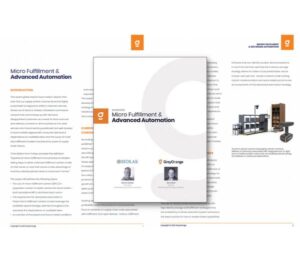This paper will address the following topics
- The use of micro-fulfillment centers (MFCs) to better service local markets
- The requirement for advanced automation to best leverage the available square footage, optimize throughput and decrease the dependence on available labor
- An overview of the present and future market conditions and commercial automation solutions that enable the exponential growth of a micro-fulfillment strategy
- Develop a roadmap in support of a micro-fulfilment strategy that leverages advanced automation and robotics to address the immediate needs of the market and consumers.




